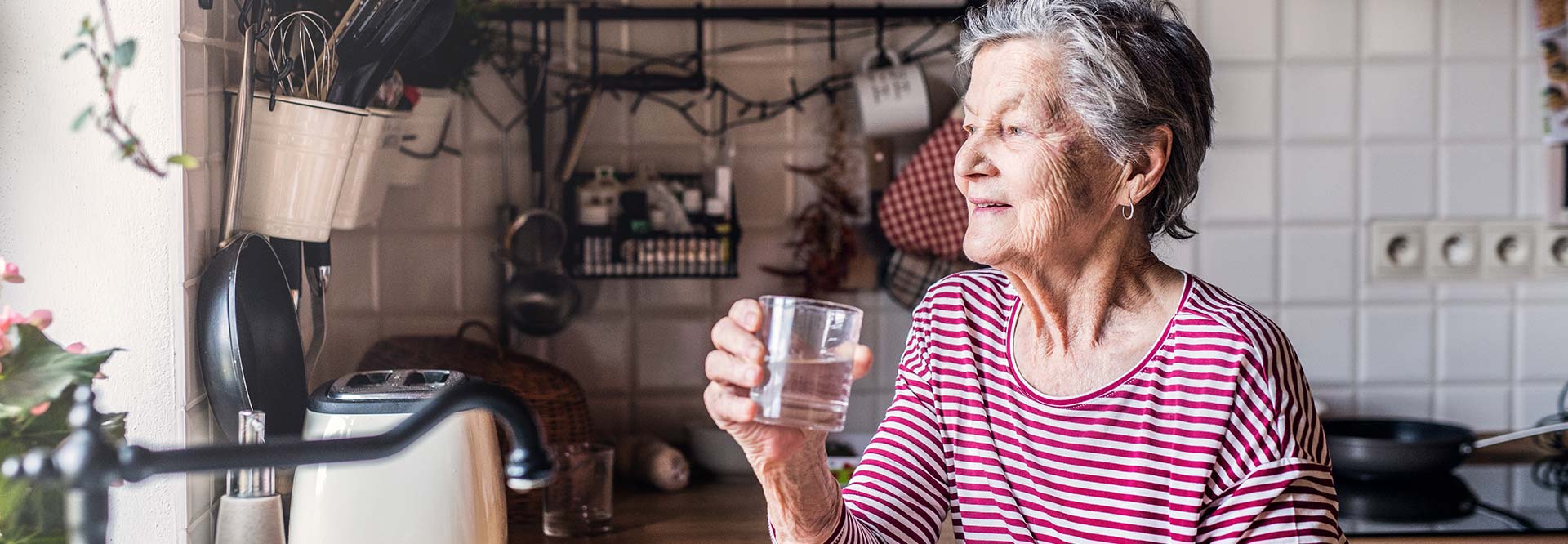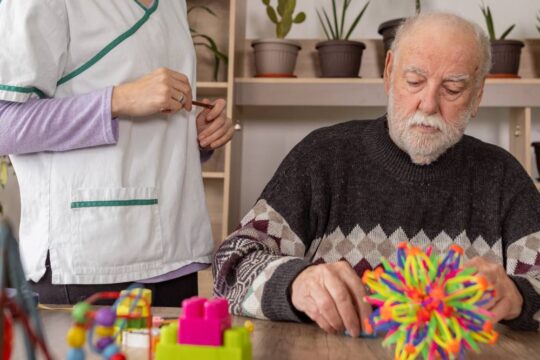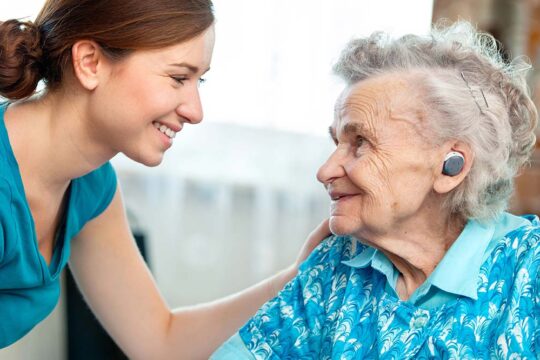
Can My Elderly Parent Live Alone?
Aging Parents Living Alone: How to Know When An Elderly Person Can’t Live Alone
Your parents are aging and seem to be doing okay living at home so far. However, most adult children begin to worry if their elderly parents can or should live alone. In addition, as parents age, physical and mental decline is common. Get the answers you need to help determine if your elderly mother or father (or other elderly person in your life) can stay home or if you need to consider other options to make an informed and safe decision about your loved one.
Signs Your Elderly Parent Can Live Alone
Not all elderly parents need daily care as they can manage their life well despite their age. If your mom has not shown signs of physical or mental deterioration that puts her in harm’s way, then staying home might be the right option. However, mom will still need more frequent check-ins.
Mental and physical decline can show up unexpectedly in the golden years, which is why their children need to check on them multiple times a week. Even if your parents can take care of themselves, consider getting a home health aide to check on them if you live far away. Sometimes the only thing an older parent needs is a little extra helping hand and assurance they can get help when needed.
Here are the tasks your parent should be able to handle with little to no assistance to live on their own:
- – Personal hygiene
- – Meal Preparations
- – Mobility without difficulty
- – Ability to transport themselves
- – Maintain a social life
- – Medication management
- – Maintain their home
- – Financial management
It’s important to remember that just because a loved one has problems in some of the areas mentioned above doesn’t indicate they need to go to a long-term care facility. Supportive assistance can be introduced into the home when household tasks and meal preparation are difficult. These requirements can be addressed with the help of a cleaning service, meal delivery service, or a few hours of in-home care.
Signs Your Elderly Parent Cannot Live Alone and Needs to Move to Assisted Living
Many signs can indicate your parents can no longer live on their own and need to move into assisted living or require other types of care. If they cannot meet most of the tasks listed above, it’s time to move your parents into an assisted living facility. On the other hand, if they can handle the majority of the tasks above, then it may not be time just yet but continue monitoring as this can change quickly.
Elderly parents who cannot take care of their basic needs such as cleaning, cooking, bathing, walking, or taking their medications at the right time should move into an assisted living facility. Mental, emotional, or cognitive decline can also indicate that your elderly loved one is no longer safe living alone.
Also Read: Elderly Parent Acting Like a Child
When should I be concerned about my elderly parents living alone?
Many seniors begin to spend more time alone away from friends and family or community events, which could signify mental decline. Going out or socializing may be overwhelming as it takes too much effort and preparation. Along with living like a hermit, they may stop caring for their home the way they usually care.
Another indicator that your mom or dad should not live alone could be stacks of unopened mail or growing piles of clutter. They may no longer have the energy or capacity to care for mess or sort out their life, whether physically or mentally. The bills may seem too overwhelming to pay and get left until utilities, and other accounts get shut off or sent to collections.
Weight loss should not be left unattended in the elderly as our bodies decline with age. Losing too much weight could indicate a health concern they cannot handle on their own from a myriad of options. Additionally, they may find shopping for food more difficult or have ill-fitting or broken dentures.
Furthermore, simple tasks or remembering to do tasks may become more difficult for aging parents. Even remembering directions to familiar places can demonstrate a decline worthy of assistance. This could translate into other areas of their life, such as miscalculating their medications.
Finally, as parents age, they may become defensive or paranoid of others and even the news which could signal the end of their ability to maintain their current lifestyle. Also, consider their energy levels, eyesight, and hearing when determining if you need to find new living arrangements for your parents.
Options For When Your Elderly Parent Cannot Live Alone
The optimal living arrangement will be determined by how much assistance they require to care for themselves. If your elderly parent insists on living alone or independently in their own home, you and they should be aware of the advantages and disadvantages of aging in place. The symptoms that your parents may need to contemplate a different living arrangement are discussed in the next section.
Most adult children first consider moving their elderly parents in with them for care when they cannot live alone. Respite care can give a full-time caretaker a much-needed break but only for the short-term such as days, weeks, or months depending on the facility.
Other families consider in-home care to help aging parents. From a live-in nurse to daily care, this is a great option for many families. In addition, some families work out a schedule among siblings to share the burden.
Independent living may be an option for seniors who simply need more community and less house maintenance. Independent living services and amenities make life easier and more convenient. Standard amenities include housekeeping, linen service, meal plans, transportation, and security.
Assisted living is a fantastic option as it gives seniors some autonomy and the care they need. Services include medication administration and assistance with using the restroom, dressing, and grooming.
Nursing homes are the next step for seniors who need more care and cannot live independently. This is a 24 hour care option for elderly parents who require medical and personal care 24 hours a day, seven days a week. Nurses and other health experts are on duty 24 hours a day.
Should an 80-year-old live alone?
Keeping an elderly senior at home is more convenient and affordable. Living at home helps elderly adults stay connected with friends and family. Aging in place can boost older individuals’ freedom and fulfillment.
Living alone helps seniors stay independent, but it’s also dangerous. Lonely seniors are more lonely than socially active seniors. Loneliness causes melancholy, anxiety, and health problems. Solo seniors may have a harder time enjoying life. Non-driving seniors may become introverted and isolated. Additionally, a senior living alone may not get emergency medical care.
Essentially, as long as the 80-year-old has access to help and socialization and can take care of their own needs, they can live alone. However, they should not always be alone. Their children or other family members should check on them several times a week to determine if they can still live alone.
Can my mom with dementia live alone?
Dementia patients often progress from complete independence to living with someone or needing long-term care. When a person who has lived alone must consider other options, the move can be difficult for everyone. Some dementia patients hide or compensate for their problems. Some dementia patients do not recognize their problems or blame family as their cognitive health declines.
As a family member or caregiver for someone with dementia, it can be hard to tell if someone living alone needs help. Check for changes in their personality, behaviors, eating habits, personal care habits, and household maintenance changes to determine if they need additional care. Other signs an elderly parent with dementia cannot live alone include wandering, getting lost or confused easily, becoming forgetful, having paranoid thoughts, and lack of good judgment.
How long can a parent with dementia live at home?
Dementia worsens over time. A dementia patient can expect to live about ten years without a cure. Alzheimer’s does not have a cure and leads to rapid decline requiring specialized care. In both, cognitive decline requires care in a care facility as they usually need more help from medical professionals than they can get at home.
If a person’s dementia has progressed, they may need to be placed in a care facility with care available day and night. As dementia progresses, the patient will need more care and support. Talk to their doctor to determine if it’s time for long-term care before your elderly parent becomes endangered by their cognitive decline.
Final Thoughts
While some elderly can live at home for extended times, not all can, and it’s normal for aging adults to need extra care. Knowing what signs to look for can help you to determine if your parents should stay at home or if it’s time to move into an assisted living facility can make the decision easier. Call Stellar Care today and determine if our elderly care options are right for your family.
Related Articles
Struggling with an elderly who won’t eat? Learn why appetite declines with age and discover practical ways to encourage healthy eating.
Struggling with an elderly who won’t eat? Learn why appetite declines with age and discover practical ways to encourage healthy eating.
Discover the common causes of unsteady gait in the elderly, explore types of gait patterns: learn how to address mobility challenges.
Explore how hearing loss in seniors affects cognitive health and increases dementia risk, with tips for prevention and care.



